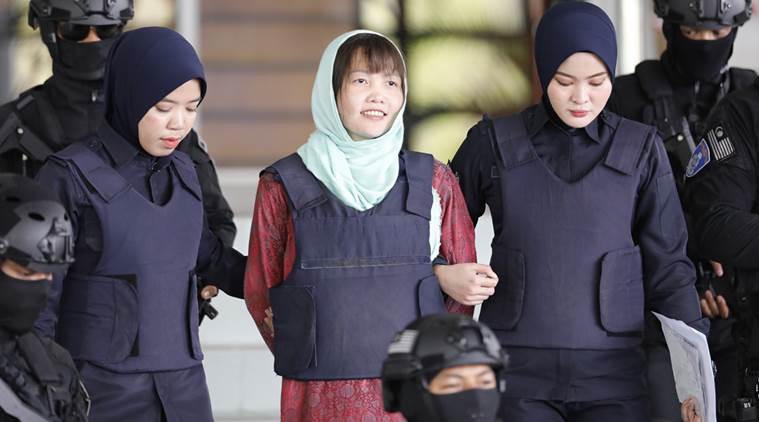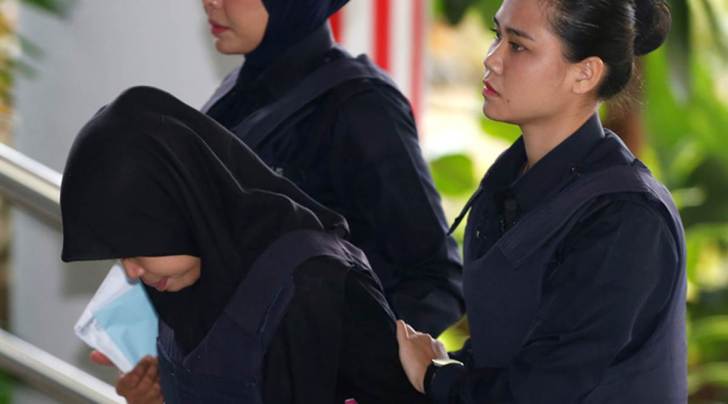
On February 13, 2017, North Korean leader Kim Jong Un’s estranged half-brother, Kim Jong Nam, entered the Kuala Lumpur airport en route to Macau, for what was a routine visit for him. Nam, who was dressed in a grey suit, glanced up at the departures board and walked to check in for his flight, but never made it after being poisoned with a chemical weapon. Now, the second of the two women who was allegedly involved in the shocking murder, could also be set free within a month after the first accused was released.
How the murder took place
As Kim Jong Nam entered the airport, a woman stood in front of him as a distraction.
Her partner approached from behind, pulled from her handbag a cloth drenched in liquid VX, a chemical weapon, reached around his head and clamped it to his face. That was enough to deliver deadly poison to the 46-year-old.
Carrying a backpack containing $100,000 and four North Korean passports, Kim Jong Nam was travelling under his pseudonym “Kim Chol”, police said. After the attack, he approached a help desk and explained that someone seemed to have grabbed or held his face and now he felt dizzy.
He was taken to a small glass-fronted surgery one floor down, near the arrivals area, but it was too late. Kim Jong Nam died in an ambulance on the way to the hospital.
Kim Jong Nam was the eldest son in the current generation of North Korea’s ruling family. He had been living in exile in Macau before the killing, having fled his homeland after his half-brother Kim Jong Un became North Korea’s leader in 2011 following their father’s death.
The assassination drew global attention for its audacity and diplomatic implications, with South Korean and Western officials accusing North Korea of a state-sponsored hit. Pyongyang denied any involvement in the murder.
The brazen murder was caught on grainy CCTV footage broadcast around the world, yet many details remain a mystery.
Who were the women
The woman who smeared Kim Jong Nam with the nerve agent was a 26-year-old Indonesian national, Siti Aisyah, and the other woman was identified as a Vietnamese national identified as Doan Thi Huong.
Both women told authorities they believed they were participating in a television prank. During the attack, Huong was wearing a T-shirt emblazoned with “LOL”, or “laugh out loud”.
The two women were the only suspects in custody after four North Korean suspects fled the country the same morning Kim Jong Nam was killed.
Aisyah’s lawyer said that she was at a pub in Kuala Lumpur in early January when she was recruited by a North Korean man to star in video prank shows. Over the course of several days, the North Korean, who went by the name James, had Aisyah go out to malls, hotels and airports and rub oil or pepper sauce on strangers, which he would film on his phone, the lawyer said.

Aisyah was paid $100-$200 for each prank and hoped the income would allow her to stop working as an escort.
She then flew to Cambodia, where she was introduced to a man called Chang, who said he was the producer of video prank shows for the Chinese market. Back in Malaysia, Chang asked Aisyah to do several more pranks at the Kuala Lumpur airport a few days before Kim was attacked. At the airport on the day of Kim’s death, Chang pointed him out to Aisyah as the next target and put the poison on her hand, her lawyer said. Aisyah’s lawyer said that she didn’t know that she was using poison.
Little is known about Huong, who was raised in a rice farm in northern Vietnam. Her family said they had hardly heard from her since she left home a decade ago.
The fallout
In March 2017, the Malaysian government expelled North Korean Ambassador Kang Chol, days after scrapping a visa-free entry for North Koreans. Kang Chol, who had denounced Malaysia’s investigations into Kim’s death and accused Kuala Lumpur of colluding with outside forces to defame Pyongyang, was given 48 hours to leave the country.
North Korea banned Malaysian citizens in its country from leaving as tension escalated over Kim’s killing. Malaysia responded with a similar ban.
The two countries later struck a deal to end a diplomatic row. However, Malaysian officials have never officially accused North Korea and made it clear they didn’t want the trial of the two women to politicised.
What the two women were accused of and why they were released
The two women, were accused of murder and faced the death penalty if they were convicted. Both of them pleaded not guilty. Indonesia and Vietnam hired lawyers to represent the two women.
On March 11, the attorney general took a stunning decision to drop the case against Aisyah on March 11. The decision came after some high-level lobbying from Jakarta. Immediately after the judgment, Siti Aisyah stood up in the dock, cried and hugged her co-defendant, Doan Thi Huong of Vietnam, before she left the courtroom.
Prosecutor Iskandar Ahmad said the discharge not amounting to acquittal meant Aisyah could be charged again, but there were no plans to do so. The reason for the withdrawal of the murder charge was not given.
Huong sought to be acquitted after Aisyah was freed, but prosecutors rejected her request.
On Monday, Huong pleaded guilty to a lesser charge in a Malaysian court on Monday, with her lawyer saying she could be freed as early as next month. She pleaded guilty to voluntarily causing injury with a dangerous weapon.
High Court judge Azmi Ariffin sentenced Huong to three years and four months from the day she was arrested on February 15, 2017. Huong’s lawyer Hisyam Teh Poh Teik said his client is expected to be freed by the first week of May, after a one-third reduction in her sentence for good behaviour.
The judge told Huong she was “very, very lucky” and he wished her “all the best”. Vietnamese officials in the courtroom cheered when the decision was announced.
with inputs from Reuters and AP